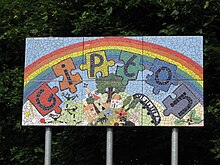Gipton
| Gipton | |
|---|---|
 Sign at the Gipton Border outside Gipton Gate West. Locally made mosaic. |
|
| Gipton shown within West Yorkshire | |
| OS grid reference | SE334348 |
| Metropolitan borough | |
| Metropolitan county | |
| Region | |
| Country | England |
| Sovereign state | United Kingdom |
| Post town | LEEDS |
| Postcode district | LS8/9 |
| Dialling code | 0113 |
| Police | West Yorkshire |
| Fire | West Yorkshire |
| Ambulance | Yorkshire |
| EU Parliament | Yorkshire and the Humber |
| UK Parliament | |
Gipton is a suburb of East Leeds, West Yorkshire, England, between the A58 to the north and the A64 to the south. It is joined with Harehills (adjacent to the west) as a City Council Ward. The suburb falls within the Gipton & Harehills Ward of the Leeds City Council.Gipton Wood is an area north of the A58 in the Roundhay Ward.
The 1817 village was west of the location now called Gipton, which contained the Gipton Spa or bathhouse in what is now Gledhow Valley Woods.
Gipton derives from Old English: the first element is a personal name: in this case, it is Gippa (same as in Ipswich, although almost certainly not the same man) and tun "village, settlement, farm" (here, it refers to a village). The town's name was recorded as Cepetun, suggesting village with a market, suggesting a trading-town, or residence of the traders, as with Market Weighton. The first element of the name in the Domesday Book record wrongly suggests Old English ceap "market, trading-place", but it was a corruption of the personal name, Gippa. However, a record from 1018 as Gipentune proves that the first element is a personal name. The name Coldcotes which prefixes many of the areas street names comes from 'cold cottages'.
The area of east Leeds from Burmantofts and Harehills to Killingbeck,Seacroft, Manston and Crossgates has a long history of mining for coal, ironstone and fireclay, with a large number of pits. Gipton Pit and the railway serving it opened in circa 1891/92 and was owned by the Low Moor Coal and Iron Company of Bradford who held extensive mineral leases in the Harehills area.The original lease was for 40 years and covered the extraction of coal and ironstone under the land at Potter Newton and Coldcotes. In 1896, the lease was renewed for a further 40 years. The pit was sunk in the wooded farmland between Harehills Lane and Oakwood Lane. The Low Moor Colliery Railway that linked Gipton Pit with the coal staithes on Harehills Lane can still be traced for much of its original length. At the eastern end of the railway, the pit head buildings, with winding gear, two shafts and railway sidings were just north of where Thorn Mount and Thorn Walk meet. The pit was eventually taken over by the Harehills Colliery Company in circa 1898 and was then closed in 1921. Much of the spoil heaps have been removed over the many years since the pit closed. The only remaining heap has recently been levelled and a new housing estate built.
...
Wikipedia

